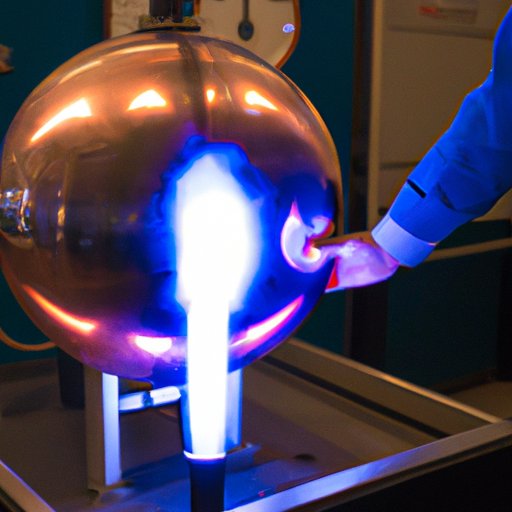Introduction
Plasma science is a branch of physics that studies the behavior of charged particles in an ionized gas or plasma state. Ionized gases are composed of atoms or molecules that have been stripped of one or more electrons and are therefore electrically charged. Plasma science seeks to understand the different properties of plasmas and their interactions with other forms of energy, such as electric and magnetic fields.
Definition of Plasma Science
The Institute of Electrical and Electronics Engineers defines plasma science as “the study of the behavior of charged particles in an ionized gas, or plasma, and their interactions with electric and magnetic fields.” Plasma consists of a mixture of ions and electrons, which are electrically charged particles that can be influenced by electromagnetic fields. Plasmas are found in nature, such as in lightning, auroras, and the sun’s atmosphere, and can also be created artificially in laboratories. Plasma science is used to study the behavior of these particles and their interactions with other forms of energy.
Overview of Applications
Plasma science has many applications in areas such as energy production, manufacturing, astronomy, chemistry, and medicine. In energy production, plasma technology is used in nuclear fusion reactors and other forms of clean energy generation. In manufacturing, plasma is used in welding, cutting, and etching processes. In astronomy, plasma science is used to study the sun and other stars, as well as interstellar gas clouds and black holes. In chemistry, plasma is used to study chemical reactions and catalysts. In medicine, plasma is used to treat cancer and other diseases.
Fundamentals of Plasma Science
To understand the fundamentals of plasma science, it is important to understand the basic principles and terminology associated with plasma. Plasma is composed of ions and electrons, which are electrically charged particles. These particles can be influenced by magnetic and electric fields, and the behavior of the particles is determined by the forces between them. The temperature of the plasma is also important, as it determines the speed at which the particles move and interact.
Types of Plasmas
There are several types of plasmas, including thermal, non-thermal, and low-temperature plasmas. Thermal plasmas are hot and dense, and consist of particles that are moving rapidly. Non-thermal plasmas are cooler and less dense, and consist of particles that are moving slowly. Low-temperature plasmas are even cooler and less dense, and are often used for medical applications.
Emerging Technologies Utilizing Plasma
Plasma science is being used in a variety of emerging technologies, such as energy production and manufacturing.
Uses in Energy Production
Plasma technology is being used in a variety of energy production methods, such as nuclear fusion reactors. Nuclear fusion is the process of combining two light atomic nuclei to form a heavier nucleus, releasing energy in the process. This process is similar to the process that occurs in stars, such as the sun, and can potentially provide a clean, renewable source of energy. Plasma technology is also being used in other types of energy production, such as solar power and geothermal energy.
Uses in Manufacturing
Plasma technology is also being used in manufacturing processes, such as welding, cutting, and etching. Plasma welding uses high temperatures to melt material together, creating a strong bond between two pieces of metal. Plasma cutting is used to cut through metal with a high-pressure stream of plasma, and plasma etching is used to create intricate patterns on surfaces.
Plasma in Astrophysics, Chemistry and Medicine
Plasma science is also used in astrophysics, chemistry, and medicine.
Role in Astronomy
In astronomy, plasma science is used to study the sun and other stars, as well as interstellar gas clouds and black holes. By studying the behavior of plasmas in these environments, astronomers can gain a better understanding of the formation and evolution of stars and galaxies.
Role in Chemistry
In chemistry, plasma is used to study chemical reactions and catalysts. By studying the behavior of plasmas, chemists can gain a better understanding of how chemicals interact with each other and how they can be used to produce new compounds.
Role in Medicine
In medicine, plasma is used to treat cancer and other diseases. By using plasma to target and destroy cancer cells, doctors can reduce the side effects of chemotherapy and radiation therapy. Plasma is also being used to treat infections and wounds, and to sterilize medical equipment.
Benefits and Challenges of Plasma Science Research
Research into plasma science has the potential to unlock many new opportunities, but there are also some challenges.
Advantages of Plasma Science
Research in plasma science has many advantages. For example, it can lead to the development of new forms of clean energy production, as well as new manufacturing processes that are more efficient and less expensive. It can also provide insights into the formation and evolution of stars and galaxies, as well as new ways to treat diseases and infections.
Limitations of Plasma Science
However, there are also some limitations to plasma science research. For example, it requires expensive equipment and highly trained personnel to operate, and the results of experiments can be difficult to interpret. Additionally, plasmas can be dangerous if not handled properly, and can cause serious injuries or even death.
Conclusion
Plasma science is a fascinating field of study that has many applications in energy production, manufacturing, astronomy, chemistry, and medicine. It has the potential to unlock new opportunities, but also comes with challenges such as the need for expensive equipment and highly trained personnel. By continuing to research this field, scientists can continue to uncover new insights and develop new technologies that can benefit society.
(Note: Is this article not meeting your expectations? Do you have knowledge or insights to share? Unlock new opportunities and expand your reach by joining our authors team. Click Registration to join us and share your expertise with our readers.)
